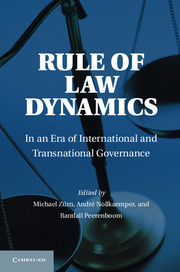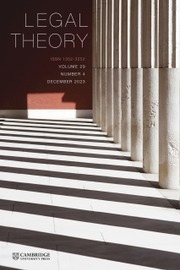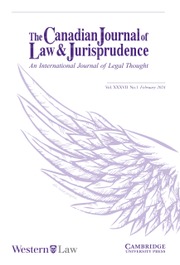The Rule of Law in the Real World
In The Rule of Law in the Real World, Paul Gowder defends a new conception of the rule of law as the coordinated control of power and demonstrates that the rule of law, thus understood, creates and preserves social equality in a state. In a highly engaging, interdisciplinary text that moves seamlessly from theory to reality, using examples ranging from Ancient Greece through the present, Gowder sheds light on how societies have achieved the rule of law, how they have sustained it in the face of political upheaval, and how it may be measured and developed in the future. The Rule of Law in the Real World is an essential work for scholars, students, policymakers, and anyone else who believes the rule of law is critical to the proper functioning of society. For more information, visit http://rulelaw.net. This book is also available as Open Access on Cambridge Core.
- Outlines a radical new conception of the rule of law in terms of social equality
- Proposes an empirical methodology for measuring the rule of law
- Available as Open Access on Cambridge Core
Reviews & endorsements
'Paul Gowder's masterpiece articulates a new vision of the rule of the law that protects the disempowered and marginalized, and that demands that the nation-state rationalize its coercive power. He relentlessly attacks irrational social, economic and political hierarchies, particularly those that give continued vitality to racial inequality in the US today. As such his rule of law is firmly rooted in notions of human rights, and looks askance at soaring inequality in the US. This rule of law protects real people in need of real protection, rather than serving as just another rhetorical instrument in the arsenal of the wealthy and powerful. It also serves, incidentally, as a bedrock foundation for economic development and a tool that can help avoid financial disruptions like that seen in 2008.' Steven A. Ramirez, author of Lawless Capitalism
'The Rule of Law in the Real World explores and connects legal philosophy, conceptual and normative, as well as historical interpretation and social sciences, policy analysis, and advocacy. It makes insightful and distinctive contributions in each domain. Moreover, it brings them into mutually informing connection. Standard inmates of the disciplines rarely make (or even imagine) such connections, even when their subject - the rule of law - bears the same name. Gowder's achievement is thus far more than a sum of its exemplary parts. It is an all too rare combination of theoretical cogency, normative sophistication and ambition, empirical attentiveness, and real world engagement and pay-off.' Martin Krygier, Gordon Samuels Professor of Law and Social Theory, and Co-Director, Network for Interdisciplinary Studies of Law, University of New South Wales
'Gowder's thought-provoking contribution is a bold vision for the Rule of Law, providing some quantum of certainty to an uncertain ideal in uncertain times.' James Campbell, SCOLAG Legal Journal
Product details
February 2016Hardback
9781107136892
288 pages
229 × 152 × 17 mm
0.56kg
8 b/w illus. 3 tables
Available
Table of Contents
- Introduction
- 1. The rule of law: a basic account
- 2. The strong version of the rule of law
- 3. Generality and hierarchy
- 4. Egalitarian liberty and reciprocity in strategic context
- 5. Ισονομια: the dawn of legal equality
- 6. The logic of coordination
- 7. Parliament, crown and the rule of law in Britain
- 8. The logic of commitment
- 9. The role of development professionals: measurement and promotion
- Conclusion: a commitment to equality begins at home.







